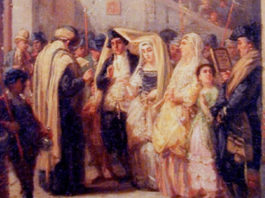The Ketuba, which is the Jewish marriage document, outlines the husband’s obligations to his wife. During the wedding ceremony, the groom declares that he is taking his bride as his wife “according to the law of Moses and Israel,” implying that he accepts all the responsibilities of a Jewish husband.
In this week’s Parasha Mishpatim, the Tora establishes the three primary duties of a husband towards his wife:
- She-erah: providing his wife with sustenance.
- Kesutah: supplying her with clothing and lodging.
- ‘Onatah: being intimate with her.
- She-erah
Theprimary responsibility of the husband is to provide financial support for his wife. This is the first of the three duties stated in the Torah (Exodus 21:10), which the rabbis refer to as “mezonot” (food, i.e., alimony/aliment = food).
Maimonides provides a few examples based on ancient traditions brought by the Talmud:
According to MT, Ishut 12:10-11, the husband must provide food for his wife and children according to his financial means. If the husband is poor, he should provide only two basic meals a day, whereas a wealthy husband should ensure that his wife and children have nutritious food (meat, fish, or whatever is customary) daily.
According to MT, Ishut 12:16-17, if a husband goes on a business trip overseas (in ancient times, people would travel overseas for months or years with virtually no possibility of communication), and his wife is left with no means of obtaining food, the rabbinical court may confiscate and sell the husband’s assets to provide for his wife and children, provided that at least three months have passed since the husband’s departure. It was assumed that thoughtful husbands would leave sustenance for their families for at least 90 days.
- Kesutah, which literally means “her clothing,” is an obligation of a Jewish husband to provide his wife with appropriate clothing, bedding, furniture, and a place of residence.
Clothing: The husband is required to provide his wife’s social needs, that is: suitable clothing for every season of the year. The quality of clothing provided must be in accordance with the husband’s financial ability and the local custom and fashion. For instance, the social needs of a woman residing on a farm differ from those living in a city (Maimonides, MT Ishut 13:2). Additionally, the husband is responsible for providing non-essential items such as jewelry and cosmetics at a level that aligns with the balance between his financial capability and the wife’s social needs.
Place of residence: The place of residence is often agreed upon and written in the Ketuba. In the event that the husband wishes to change the usual place of residence, the wife is expected to move with him. However, there are exceptions, such as when the neighborhood is disreputable, in which case the wife can refuse to move to a more violent or corrupt place. Moreover, if the couple lives in Israel, the wife can decline to move out of Israel or leave Jerusalem if they live in Jerusalem (13:15, 13:19-20) even to move to a more comfortable place.
- ‘Onatah: The Tora explicitly grants conjugal rights to the wife. Exodus 21:10 states that the husband “must not deprive his wife of her food, clothing, and marital rights.” Maimonides states that a husband’s consistent refusal to engage in sexual relations deliberately or maliciously is a transgression of a Biblical prohibition. In such a case, the woman has legal grounds to ask for a divorce, claiming the total amount of the financial compensation established in the Ketubah. However, this rule does not apply when the husband’s abstinence is health-related (Maimonides MT, Ishut 14:7). The Talmud discusses the expected frequency of the husband’s marital duties based on his occupation (14:1).
Although not explicitly based on a Biblical statement, the wife is also expected to fulfill her conjugal duties. If a wife permanently denies her husband his conjugal rights without a justified reason or maliciously (kede letsa’aro), she is considered a rebellious wife (moredet) and in the event of divorce, she is not entitled to any compensation (14:9).
The primary purpose of Mitsvat ‘Onatah is to strengthen the loving bond between husband and wife. The Tora commands the couple to have children (peru urbu) in a separate Mitsva. This Mitsva, ‘Onatah, is independent of the intention of procreation. Even when conception is impossible, such as during pregnancy, when the woman is under a permissible form of birth control, or when the wife is no longer able to bear children, the couple is still expected to have an active married life.



